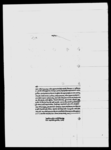An arjī by Lokaramaṇa Upādhyāya providing a political report from Calcutta (VS 1895)
ID: DNA_0001_0032
Edited and
translated by Manik Bajracharya, Simon Cubelic, and Rajan Khatiwoda
Created: 2015-12-20;
Last modified: 2023-06-06
For the metadata of the document, click here
The accompanying edition, translation/synopsis and/or commentary are available under the terms of the Creative Commons Attribution-ShareAlike 4.0 International License
Abstract
In this diplomatic briefing Lokaramaṇa Upādhyāya reports about the appointment of a new British resident to Burma; the state of the British-Burmese relations; the detention of a Nepalese envoy on his way to Lahore from Ludhiana; and the activities of the secretary to the governor general.Diplomatic edition
[1r]
1श्रीदुर्गाज्यू\1⟪नं३२⟫1अर्जि¯¯ ¯¯ ¯¯ ¯¯ ¯¯ ¯¯ ¯¯ ¯¯ ¯¯ ¯¯ ¯¯ ¯¯2उप्रान्त•कर्नैलविन्सन्साहववर्माकामुलुककारजिडन्टभै•वादसाहिजंगिजहाज१रधुव़ाकोजहा
3ज१साथलीवर्माकामुलुकतिरगय़ाकाछनइनलाइव़ाहारहनदिय़ासलुकराष्याभन्यालडाञि
4हुन्याछैन•इनलाइवाहारहनदिएनन्फेरइन्सितपनिव़ाहा वत्सलुकिगर्याभन्यालडाञिहु
5न्याछभनि•षवर्काकागजमाछाप्याकोछविन्सिन्साहवलाइवर्माकामुलुकमा रहनदिएनन्
6भन्या•ईन्लेव़ाहावाटषवरलेष्यापछिनवावगवर्नरपनिडाकमाकल्कत्ताआउन्याछन्भन्न्या
7षवरअंरेजहरूकाजवानिसुनिन्छनेपालकाव़कीललाइलुधिञानामालाहौरतिरजान
8मनाहिगरिरोकिराष्याकोछभनिफार्सिअषवार्मार•समाचारदर्पण्अषवार्माछाप्याकोरहेछ
9दुवैअषवारहजूर्माचह्राइपठायाकोछमैन्हामैन्हामासाहवसिकृटरिदर्वार•गर्थ्या३मैन्हादेषि•
10ञाहागर्मिज्यादाहुन्छभनिअचानक्गैवस्याकाछन्•वाहावाटआइकौसलमाकामगर्छन्•मला
11इफुर्सतछैनभनिदर्वार•गर्दैनन्•आजकालपुर्वपच्छिमतिरकोगडवडहुनाले•कामलेफुर्सत्
12नपाइदर्वार•वन्दगर्याकोहोलाभन्याजस्तोलाग्छपायाकोषवरविन्तिचह्राइपठायाकोछइतिसम्व
13त्१८९५सालमितिश्रावणवदि१रोज१मोकाम्कल्कत्तामीतपूरशुभम्¯¯ ¯¯ ¯¯ ¯¯ ¯¯
14सेवकलोकरमणोपाध्यायकोवेदोक्तःपुरा
15णोक्तःसहश्रकोटिसुभासीर्वादशुभम्¯¯ ¯¯ ¯¯ ¯¯ ¯¯
Translation
[1r]
Glorious Durgā
Number 321
Uprānta: When Sāhaba Colonel Benson (text: Binsan)2 became resident to the kingdom of Burma, he left for the kingdom of Burma with one imperial military ship and one steam-ship. There will be no war if they let him reside there and treat him well. It has been printed in the newspapers that there will be war if they do not let him reside there and if him too they once again do not treat well. It is heard from the words (jabāni) of the British that if Sāhaba Benson (text: Binsin) is not allowed to reside in the kingdom of Burma—[and if] once he has written to that effect from there—the navāba governor3 will also come to Calcutta in [response to] the call.
It turns out, as printed in the Persian-language newspaper and the Samācāra Darpaṇa,4 that the Nepalese envoy has been stopped in Ludhiana and not allowed to go on towards Lahore. Both newspapers have been sent to you. The sāhaba secretary5 used to hold darabāra6 every month. Three months ago he suddenly left, saying that it would be getting very hot here. He came back from there and worked in the Council (kausala)7 . He said that he no longer holds darabāra [since] he is not free. I think that the holding of darabāra has been stopped since there are disturbances both towards the east and west8 nowadays and [he has] no time on account of [his] duties.
The news received has been sent [to you]. On Sunday, the 1st of the dark fortnight of Śrāvaṇa in the [Vikrama] era year 1895 (1838 CE). Residence: Chitpur, Calcutta. Auspiciousness. A thousand crores of auspicious blessings from your servant Lokaramaṇa Upādhyāya as uttered in the Vedas and Purāṇas. Auspiciousness.
Commentary
This document belongs to a series of diplomatic briefings sent by Lokaramaṇa Upādhyāya, who served as a chief Nepalese envoy in Calcutta (see DNA_0001_0030, DNA_0002_0005, DNA_0002_0016, DNA_0002_0019, DNA_0002_0044, DNA_0004_0031, DNA_0004_0034). Lokaramaṇa begins his report with the British-Burmese tensions caused by the mistreatment of the British resident to the kingdom of Burma. The predecessor of Colonel Benson as resident to the kingdom of Burma, Major Burney, resigned his post in 1837 after not being received by King Tharrawaddi. The king declined to receive Colonel Benson as well, in consequence of which the latter too, in 1839, resigned his post (cf. Dautremer 1913: 20).
He further reports about the detention of another Nepalese envoy. The latter may have been Māthavara Siṃha Thāpā, nephew of Bhīmasena Thāpā. According to Kanchanmoy Mojumdar (cf. Mojumdar 1973: 31) Māthavara Siṃha Thāpā was sent to Lahore to forge an alliance with King Raṇajit Siṃha. In order to prevent this, the British detained him in Ludhiana.

